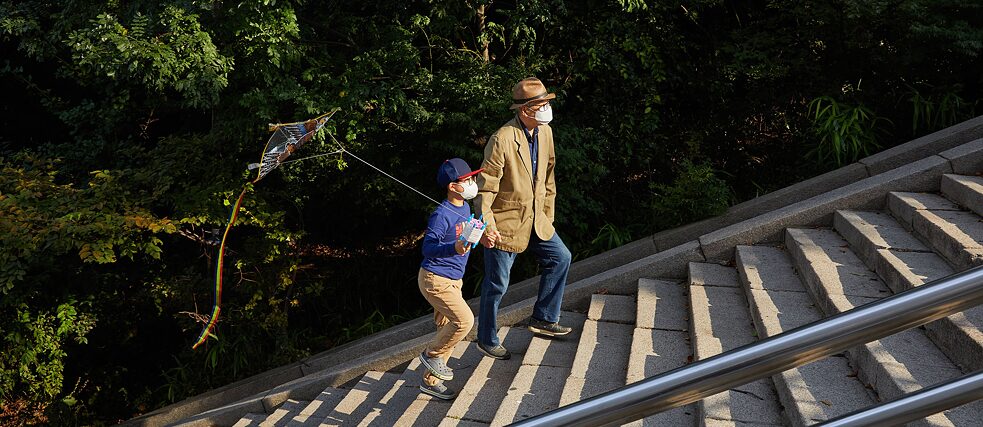Living Together in the Pandemic
A Society in Transition

In South Korean society, it is quite common for parents to continue to support their adult children financially for many years, and thus there is a close bond between the two. However, their relationship has been strained, not least since the beginning of the pandemic. Professor of philosophy Kwang Sun Joo talks about a conflict between the generations, which the South Korean government also takes advantage of.
By Kwang Sun Joo
In the year 2020, South Korean men in their fifties and sixties stood under critic. The reason for that were news that showed them not wearing masks and not keeping safety regulations. That is why people started to say things as “these elderly men again”. Then, incidents of mass infections under young adults in their twenties and thirties occurred in the streets of Itaewon, a nightlife district in Seoul, which lead them to be criticised as the generation that is indiscrete and causes trouble for others. The old and the young generation disdained and insulted each other. According to some people’s opinion, a “war between the generations” broke out.
And also in 2021, corona was still part of our world, and the “war of the generation” was going on. On one side is the older generation, which accused the government of not providing enough vaccines, and blaming the younger generation for spreading the virus. On the other hand the generation of the 20-and-30-year-olds protested against accusations of being the infecting “perpetrators”, but rather the “victims”, as they were initially not given vaccines. COVID-19 caused to widen a huge gap between the generations, which has already existed before.
A conflict between the generations
Though the term generation is used a lot in South Korea, its meaning isn’t all too clear. If the term is viewed from a historical perspective, it means that people develop a collective identity because they have experienced a certain historical event together and had to fight political battles to solve social problems. However, there is no sense of collective identity among 20- to 30- year olds and 50- to 60- year olds, so there would be no one to drive social discourses and address problems within the generations. Hence, I consider this “war” as something that emerged as a result of the stress and panic of getting infected with corona, so people needed an object to vent their hatred.Even before COVID-19, the expression of a “generational war” existed in South Korea. The “war of the generations” means in this case the conflict between the generations about governmental funds, work places and social opportunities. There are four aspects that make up the structure of the thesis of the “generational war”. Due to low birth rates and higher life expectancy, the population rapidly aged. Also, the young generation tends to not vote at elections, whereas the older generation does, which, along their growing share of population, increases their political influence. In addition to that, average life expectancy is getting longer, which leads to the older generation receiving more benefits from society than they themselves contributed to society in their younger years. The last aspect shows that South Korea is developing into a welfare country. The theorists supporting the “generational war” claim that with their strong political influence, the aged population directs more public money from the educational sector to senior welfare, which leads to less money for raising children. If we look closely though, it is true that not only the number of older citizens in society is increasing, but also the benefits they receive, but it would be wrong to conclude that this leads to the problems younger generations face right now. Rather, the cause is to be seen in the worsening of the situation at the employment market.
Therefore, the “war between the generations” should instead be seen as a kind of illusion that is kept up, for example, by power-hungry companies or politicians in order to secure the support of the younger generation. Their aim is to set both generations against each other in order to pass on the responsibility for their failed policies. Here, however, the younger and older generations play a zero-sum game, divide themselves and become resentful to each other.
Who supports whom?
But when the 20-to-30-year old generation and the 50-to-60-year old generation meet at home, they are very close as parents and children. The biggest expense of the 40-year old generation, which has the best standard of living and the highest income in South Korea, is their children's education costs. So for parents and children, a harmonious relationship is indispensable.In Korean tradition, the concept of filial piety, one of the basic concepts of Confucianism, is prevalent. What that means is, that parents raise their children and care for them until the time comes that the children are all grown up, live with their parents under the same roof, while they take the turn in caring for them. Since the industrialisation, the family structure of the extended family changed into the core family, where parents live with only their children, separate from the grandparents. After the currency crisis in 1997, the children’s generation grew poorer than their parents‘. The time when children had secured a stable income and some prosperity passed. When they, as adults entered society, they were faced with poor job conditions, unstable employment, and due to increasing real estate prices they also struggled with housing shortage. So, their parents had - and have - no choice but to continuously support them.
These theorists supporting the concept of a “generational war” do certainly not think about these things that are a result of such extreme disparities. It is, of course, correct, that due to COVID-19, the job market for the younger generations has deteriorated. But to remain stuck in the “war of the generations” will only worsen the situation. Now it is time to think about the solidarity between the generations.